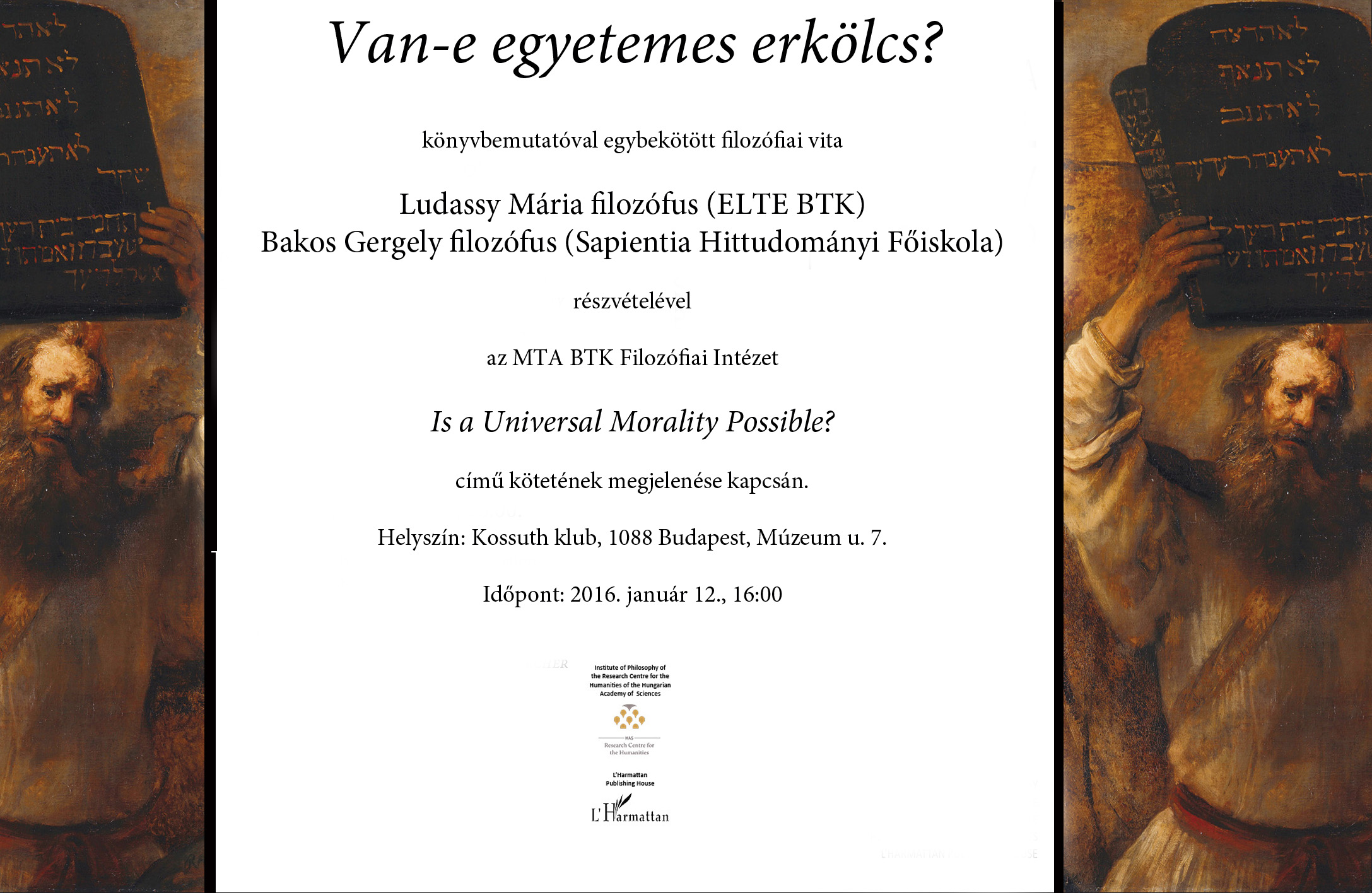
Van-e egyetemes erkölcs? - Könyvbemutató
- Részletek
- Kategória: Események
 Van-e egyetemes erkölcs?
Van-e egyetemes erkölcs?
könyvbemutatóval egybekötött filozófiai vita
LUDASSY MÁRIA filozófus (ELTE BTK)
BAKOS GERGELY filozófus (Sapientia Hittudományi Főiskola)
részvételével
az MTA BTK Filozófiai Intézet Is a Universal Morality Possible? című kötetének megjelenése kapcsán.
Helyszín: KOSSUTH Klub, 1088 Budapest, Múzeum u. 7.
Időpont: 2016. január 12., 16:00.
Kerekes Erzsébet tanulmánya
- Részletek
- Kategória: Publikációk
Kerekes Erzsébet "The Figure of the Apostle Paul in Contemporary Philosophy (Heidegger, Badiou, Agamben, Žižek)" című tanulmánya a Journal for the Study of Religions and Ideologies legújabb számában (vol.14, issue 42/ Winter 2015) jelent meg.
Kerekes Erzsébet díjat kapott
- Részletek
- Kategória: Események
Az MTA BTK Filozófia Intézetének posztdoktori kutatóját, Kerekes Erzsébetet, a Babeș-Bolyai Tudományegyetem (Kolozsvár) Értelmező munkáért járó díjban részesítette 2015.12.09-én a Szavak közt az idő című könyvéért. A tanulmánykötet, mely az Egyetemi Műhely Kiadónál (Bolyai Társaság - Kolozsvár) jelent meg 2015-ben, a vallásfilozófia és a filozófiai hermeneutika területén végzett kutatási eredményeket tartalmazza.
A szociológia abúzusai
- Részletek
- Kategória: Események
Az MTA BTK Filozófiai Intézet Tudománytörténet és Tudományfilozófia Kutatócsoportja szeretettel meghívja Önöket
című konferenciára.
A 20. század magyar bölcsészettudományában a szociológiai látásmód sokféleképpen jutott érvényre. Ennek a változatos módszerekhez, szerzőkhöz és intézményekhez kötődő, de sok tekintetben közös elméleti irányvonalnak a magyar bölcsészeti irodalom számos, immár klasszikus szövegét köszönhetjük. Ezek a szövegek generációkon át hatottak és hatnak ma is. A szociologizáló látásmód érvényesítésének azonban vannak olyan formái, amelyek átlépik a tudományosság azon határait, amelyek kijelölésében maga is aktív szerepet játszott, és olyan területeken is próbálják olykor érvényesíteni, amelyeken illetékessége megkérdőjelezhető. Ezeket a határátlépéseket nevezzük a szociológiai módszer abúzusának. Konferenciánk ennek módjait térképezi fel. Megvizsgáljuk a szociologizáló látásmód túlterjeszkedésének példáit, azok indokait és következményeit, valamint az ezekhez vezető módszereket.
Program:
13:00-13:40 - Szelényi Iván: A szociológia hármas válsága
13:40-14:20 - Tuboly Ádám Tamás: "Ami tény az tény." Az adatok szélsőségesen szociologizáló elemzése ellen
Kávészünet
14:40-15:20 - Berkovits Balázs: A társadalmi konstrukcionizmus mint a pszi-tudományok bírálata. Az enyhe értelmi fogyatékosság esete
15:20-16:00 - Keszeg Anna: Józsa Péter és Jacques Leenhardt olvasásszociológiai műve. Close reading
Kávészünet
16:20-17:00 - Zuh Deodáth: Elszociologizálás. Babits Mihály és Fülep Lajos vitája a szellemtörténetről
17:00-17:40 - K. Horváth Zsolt: A tudomány senkiföldjén. Mérei Ferenc korai szociálpszichológiája és a durkheimi hagyomány Magyarországon, 1935-1945.
17:40-18:20 - Demeter Tamás: A szociologizáló hagyomány abúzusai
A rendezvény időpontja: 2015. december 15.
A rendezvény helyszíne: 1014 Budapest, Országház u. 30.
Könyvbemutató a PTE KPVK-n
- Részletek
- Kategória: Sajtó
Az egyetemes erkölcs lehetőségével, napjaink társadalmi, kulturális és politikai válságjelenségeivel foglalkozott az a könyvbemutató, amelynek a PTE Kultúratudományi, Pedagógusképző és Vidékfejlesztési Kara adott otthont november 25-én. A rendezvényen az Is a Universal Morality Possible? (Van-e egyetemes erkölcs?) című, angol nyelvű tanulmánykötetet mutatták be az érdeklődőknek az alkotók. A bemutatóról bővebben itt olvashat.
Nemzet, faj, kultúra a hosszú 19. században Magyarországon és Európában
- Részletek
- Kategória: Események
Tisztelt Kollégák!
A Művészetek és tudomány a nemzetépítés szolgálatában a 19. századi Magyarországon OTKA-kutatócsoport (K 108670) és az MTA BTK Filozófiai Intézet tisztelettel meghívja Önöket a
Nemzet, faj, kultúra a hosszú 19. században Magyarországon és Európában
című konferenciára.
Időpont: 2015. december 8. (kedd)
Helyszín: MTA BTK, Bp., I. kerület, Országház utca 30. Pepita Terem (keresztszárny, 2. emelet)
Az emberi jogok és a szinoptikus jogszemlélet
- Részletek
- Kategória: Társadalomfilozófiai vitakör
Ezúton hívjuk fel a figyelmüket a Társadalomfilozófiai vitakör következő,
című beszélgetésére.
A vita során Horváth Barna szinoptikus módszerét vizsgálva többek között arra a kérdésre keressük a választ, megalkotható-e egy olyan jogelmélet, amely egyesíti az emberi jogi teóriák utópisztikus vonásait és a szakjogászat realista szemléletét. Horváth Barna munkásságát Forró Enikő írásai alapján vizsgáljuk.
Bevezető előadást tart: Forró Enikő, filozófus (Partiumi Keresztény Egyetem)
Vitaindítót tart: Sólyom Péter, jogász (Debreceni Egyetem ÁJK, Alkotmányjogi Tanszék)
A tárgyalandó szövegek ide kattintva elérhető.
Az esemény időpontja: 2015. december 2. 16.30(!!!) óra.
Az esemény helyszíne: Budapest, 1014 Országház u. 30. Pepita terem.
Varga Péter András Salzburgban
- Részletek
- Kategória: Események
Varga Péter András részt vesz az ausztriai Salzburg egyeteme által szervezett "Mind and Metaphysics" nemzetközi Brentano-konferencián "What could Husserl have preached in Halle in 1887? Conjectures about Husserl’s inaugural lecture against the backdrop of Brentano’s and Stumpf’s notions of metaphysics and philosophy" című előadásával.
További cikkeink …
120. oldal / 153


